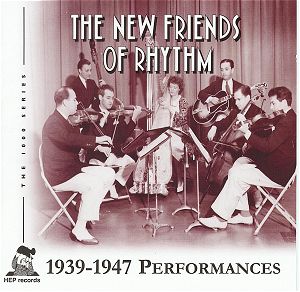Droschky Drag
When Johnny Comes Marching Home
Capriciousness No 24
Barber's Hitch
Bach Bay Blues
Fable In Sable
Riffin' Raff
Yorkshire Pudding
Shoot The Schubert To Me Hubert
Ghoulash
Foster Chile
High Voltage
Heavy Traffic On Canal Street
Mood In Question
Coo Dinny Coo
Sweet Sue Just You
Sailor's Dance
Mood In Question
Southern Comfort
High Voltage
Nightcap
Platter Chatter
Peter Ilych On The Flying Trapeze
Capriciousness No 24
Droschky Drag
Honeysuckle Rose
Barber's Hitch
Lovers of the string swing
ensemble The New Friends of Rhythm will have
a feast with this exemplary release from Hep.
Most of the group came from Toscanini’s NBC
Symphony – violinist Sylvan and cellist Alan
Shulman, violist Louis Kievman, harpist Laura
Newell and the NBC staffers Zelly Smirnoff
and guitarist Tony Colucci along with bassist
Harry Patent. Alan Shulman was the arranger
and Newell the lynchpin of the group. The
Shulmans, Smirnoff and Kievman formed the
Stuyvesant Quartet at about the same time,
a famous group that made a number of prestigious
and important recordings.
The repertoire was very much
"swinging the classics" - Bach,
Mozart, Tchaikovsky, Paganini and others and
the fare proved so popular that Victor signed
them for sessions in 1939, the fruits of which
are here. We also have five March 1939 broadcasts,
which predate the commercial recordings, and
some 1947 ten-inch sides.
Shulman’s arrangements ensured
that string distribution amongst the group
was vibrant and full of interesting textures.
For the Paganini tribute, Capriciousness No
24, string cushioning and incisive harp contributions
are the order of the day. Their Mozart is
smooth and suave. The slow movement of the
Tchaikovsky Violin Concerto makes an appearance
as Fable in Sable and is played with
giddy warmth. Raff is syncopated and there’s
some witty Hungarian Dance work in Goulash.
The group had a way with song names as a look
at the head note will tell. Shulman’s own
hit High Voltage is a kind of I
Got Rhythm in fast tempo – cosmopolitan,
full of fast New York traffic. The broadcasts
are in good sound with minimal hiss and reprise
three of the commercial discs.
Jazz fans will note that
clarinettist Buster Bailey joins the group
for three numbers – and he’s especially fluent
and impressive on Mood in Question. After
the war Bailey’s role was reprised by Hank
D’Amico, who throws off Gliere nicely. We
find that the group revisited earlier successes
and naughtily changed the titles – Southern
Comfort is none other than Foster Chile,
perhaps retitled for reasons of sensitivity.
The Bach ramble, Nightcap, is beautifully
accomplished and has a semi-improvisatory
feel.
The notes here are wonderfully
extensive and full of detail and photographs
with full discographical details. The elegant
and beautifully crafted NFOR music is given
first class restoration work to complete an
evocative package.
Jonathan Woolf
